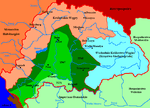Peace of Zsitvatorok
The Peace of Zsitvatorok (Hungarian: Zsitvatoroki béke; Slovak: Žitavský mier; Turkish: Zitvatorok Anlaşması) was a peace treaty which ended the Fifteen Years' War between the Ottoman Empire and the Habsburg Monarchy on 11 November 1606. The treaty was part of a system of peace treaties which put an end to the anti-Habsburg uprising of Stephen Bocskay (1604–1606).
The treaty was signed at the former mouth of the Žitava River (Hungarian: Zsitva), which flows into the Danube in Royal Hungary (today's Slovakia). This location would later become the small settlement of Žitavská Tôňa (Hungarian: Zsitvatorok), a part of the municipality of Radvaň nad Dunajom (Hungarian: Dunaradvány).
The peace was signed for a term of 20 years and has been interpreted in different ways by diplomatic historians. One point which has been debated much is whether in the language of the treaty the Ottomans recognized the Habsburg ruler as of equal standing with the Ottoman sultan. Differences between the Ottoman Turkish and the Hungarian texts of the treaty encouraged different interpretations, e.g. the Hungarians offered 200,000 florins as a once-and-for-all tribute (instead of the annual tributes of 30,000 guldens given before the war), whereas the Ottoman text foresaw that the payment was to be repeated after three years. The treaty prohibited Ottoman looting campaigns into the territory of Royal Hungary, and stipulated that Hungarian settlements under Ottoman rule could collect taxes themselves by means of village judges. The Ottomans also acknowledged the tax-free privilege of nobles. However, the Ottomans never really complied with these terms.
The treaty was signed by Sultan Ahmed I and Archduke Matthias of Austria, despite strong opposition on the part of Emperor Rudolf II, Matthias's brother. The Ottomans' inability to penetrate further into Habsburg territory (Royal Hungary) during the Long War was one of their first geopolitical defeats. However, the Treaty stabilized conditions on the Habsburg-Ottoman frontier for half a century for the benefit of both parties. The Habsburgs would face serious domestic opposition during the following years. and the Ottomans, apart from internal rebellion, had open conflicts in other parts of their frontiers (Poland and Iran).
Interestingly, in September 2015, the English translation on the Peace of Zsitvatorok Memorial reads,"The peace agreement between Rudolph I, the German Emperor and Ahmed I, the Turkish Sultan was signed in 1606 ..."
